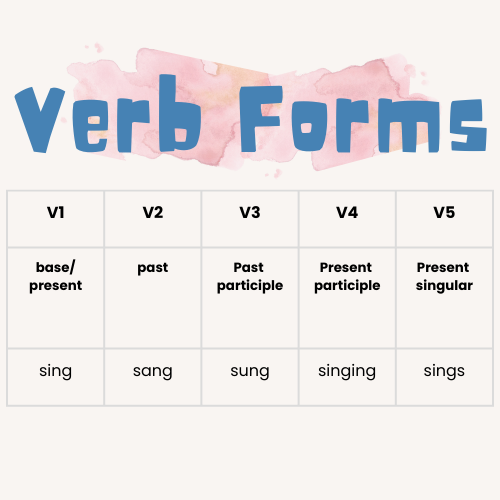Verb

What is Verb?
Simply put, verbs are words that express actions, occurrences, or states of being.
Verbs are one of the most essential parts of speech in grammar. They are used to describe what a subject does, what happens to the subject, or the state in which the subject exists. Verbs convey the main action, event, or state.
Verb Forms
| V1 | V2 | V3 | V4 | V5 | |
|---|---|---|---|---|---|
| Base/Present | Past | Past Participle | Present Participle | Present Singular | |
| REGULAR | play | played | played | playing | plays |
| IRREGULAR | write | wrote | written | writing | writes |
Types of Verb
Action Verbs:
These verbs describe physical or mental actions performed by the subject. Examples include “run,” “jump,” “eat,” “think,” and “write.”
Example:
“She runs in the park every morning.”
Linking Verbs:
Linking verbs connect the subject of a sentence to a subject complement, which provides more information about the subject. The most common linking verb is “to be” (am, is, are, was, were, etc.), but other verbs like “seem,” “become,” “appear,” “feel,” etc., can also function as linking verbs.
Example:
“He is a teacher.” (Here, “is” links the subject “He” to the subject complement “a teacher.”)
Helping Verbs (Auxiliary Verbs):
Helping verbs are used with the main verb to create different verb tenses, aspects, and moods. The primary helping verbs are “have,” “has,” “had,” “do,” “does,” “did,” “be,” “am,” “is,” “are,” “was,” “were,” “can,” “could,” “will,” “would,” “shall,” and “should.”
Example:
“She has finished her homework.” (The helping verb “has” is used with the main verb “finished” to form the present perfect tense.)
Modal Verbs:
Modal verbs are a type of helping verbs used to indicate possibility, necessity, permission, ability, and other attitudes toward the action expressed by the main verb. Common modal verbs include “can,” “could,” “may,” “might,” “will,” “would,” “shall,” “should,” “must,” “ought to,” “need to,” etc.
Example:
“You can come to the party.” (The modal verb “can” indicates the possibility of coming to the party.)



